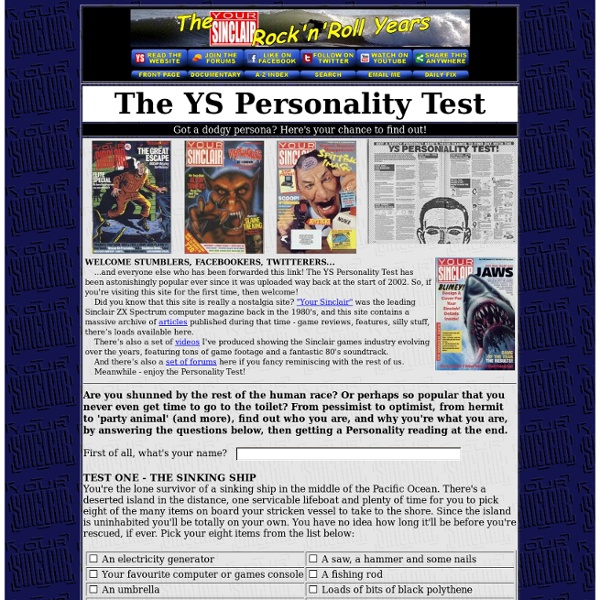



HumanMetrics - online relationships, personality and entrepreneur tests, personal solution center A Nation of Wimps Maybe it's the cyclist in the park, trim under his sleek metallic blue helmet, cruising along the dirt path... at three miles an hour. On his tricycle. Or perhaps it's today's playground, all-rubber-cushioned surface where kids used to skin their knees. And... wait a minute... those aren't little kids playing. Their mommies—and especially their daddies—are in there with them, coplaying or play-by-play coaching . Then there are the sanitizing gels, with which over a third of parents now send their kids to school, according to a recent survey. Consider the teacher new to an upscale suburban town. Behold the wholly sanitized childhood , without skinned knees or the occasional C in history. Messing up, however, even in the playground, is wildly out of style. "Life is planned out for us," says Elise Kramer, a Cornell University junior. No one doubts that there are significant economic forces pushing parents to invest so heavily in their children's outcome from an early age.
Personality Test - 41 Questions. 1 Personality. 100% Free. Personality test — get to know your personality type in 41 Questions. The test is free of charge and requires no registration. It takes about five minutes to complete. Personality Test Question 1 of 41 In phoning do you: , or Previous Question Start over Help Personality Test Question 2 of 41 Do you prefer the: Personality Test Question 3 of 41 At parties, do you: Personality Test Question 4 of 41 Do you prefer: Personality Test Question 5 of 41 Which do you wish more for yourself: Personality Test Question 6 of 41 Facts: Personality Test Question 7 of 41 Are you more likely to trust your: Personality Test Question 8 of 41 In company do you: Personality Test Question 9 of 41 In doing ordinary things are your more likely to: Personality Test Question 10 of 41 Are you inclined to be: Personality Test Question 11 of 41 Do you prefer to work: Personality Test Question 12 of 41 When the phone rings do you: Personality Test Question 13 of 41 Do you see yourself as basically: Personality Test Question 14 of 41 Are you more:
How to Avoid Procrastination: Think Concrete New study finds procrastination is warded off by considering tasks in concrete terms. Although procrastination is usually thought of as something to be avoided, this hasn’t always been the case. Surveying the history of procrastination Dr Piers Steel finds that before the industrial revolution procrastination might have been seen in neutral terms (Steel, 2007; PDF). Nowadays, though, for those living in technically advanced societies, procrastination has become a ‘modern malady': everything must be done now or, even better, three weeks ago. For good or evil there are now endless to-do lists to work through, appointments that must be kept and commitments that have to be fulfilled. Such is modern life. Whatever the cause many people certainly view their procrastination as a problem. It’s all in the construal In a new study published recently in Psychological Science McCrea, Liberman, Trope & Sherman (2008) examined one possible technique for decreasing procrastination. Abstract construal.
Personality and Relationships Most of us are allured by the attractive notion that effortless relationships exist. Whether it be happily-ever-after marriages, or friendships that last forever, or parent/child bonds which supercede the need to understand each other, we'd all like to believe that our most intimate relationships are unconditional, and strong enough to withstand whatever may come. However, at some point in our lives most of us need to face the fact that relationships require effort to keep them strong and positive, and that even wonderful, strong relationships can be destroyed by neglect. Whether you're looking to improve a love relationship, familial relationships, friendships, or employer/employee relationships, understanding your own personality type and the personality type of the other person involved in the relationship will bring a new dynamic to the situation, which will allow better understanding and communication. The same cannot be said for other kinds of relationships.
Dunning–Kruger effect The Dunning–Kruger effect is a cognitive bias wherein relatively unskilled individuals suffer from illusory superiority, mistakenly assessing their ability to be much higher than is accurate. The bias was first experimentally observed by David Dunning and Justin Kruger of Cornell University in 1999. Dunning and Kruger attributed the bias to the metacognitive inability of the unskilled to evaluate their own ability level accurately. Dunning and Kruger have postulated that the effect is the result of internal illusion in the unskilled, and external misperception in the skilled: "The miscalibration of the incompetent stems from an error about the self, whereas the miscalibration of the highly competent stems from an error about others Original study[edit] Dunning and Kruger proposed that, for a given skill, incompetent people will:[4] Supporting studies[edit] Dunning and Kruger set out to test these hypotheses on Cornell undergraduates in psychology courses. Historical antecedents[edit]
What Is CogniFit? - Mind Training Program Psych Web by Russ Dewey